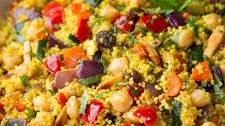The Delightful Flavours of Couscous: A Moroccan Culinary Gem
When it comes to iconic dishes that embody the essence of Moroccan cuisine, couscous reigns supreme. This beloved staple has been gracing tables across Morocco for centuries, delighting taste buds with its aromatic flavours and versatile ingredients.
A Taste of Tradition
Couscous holds a special place in Moroccan culture, often served as a centrepiece during festive gatherings, family celebrations, and everyday meals. This dish reflects the country’s rich culinary heritage and the art of communal dining that is deeply ingrained in Moroccan traditions.
The Art of Preparation
At the heart of couscous lies the meticulous process of steaming tiny grains of semolina to fluffy perfection. The light and fluffy texture is achieved through multiple rounds of steaming, allowing the couscous to absorb fragrant broth infused with spices, vegetables, and tender meats.
A Symphony of Flavours
What sets Moroccan couscous apart is its harmonious blend of sweet and savoury flavours. The dish often features a medley of ingredients such as succulent lamb or chicken, caramelised onions, chickpeas, raisins, and a burst of aromatic spices like cumin, cinnamon, and turmeric.
Versatility on a Plate
One of the charms of couscous is its versatility. It can be enjoyed in various forms – from hearty tagines topped with steamed couscous to lighter salads infused with fresh herbs and zesty dressings. Whether served hot or cold, couscous adapts effortlessly to different culinary styles.
Sharing the Joy
In Morocco, sharing a steaming plate of couscous is not just about nourishment; it’s about fostering bonds and creating memories. The communal act of enjoying this dish together embodies the warmth and hospitality that define Moroccan culture.
Experience the Magic
To truly savour the essence of Moroccan cuisine, one must indulge in the delightful flavours of couscous. Whether you’re exploring bustling markets in Marrakech or recreating this culinary masterpiece at home, let each bite transport you to the vibrant streets and bustling souks of Morocco.
Exploring the Richness of Moroccan Couscous: A Versatile, Nutritious, and Social Delight
- Versatile dish that can be enjoyed in various forms, from tagines to salads.
- Rich in flavour with a harmonious blend of sweet and savoury notes.
- Nutritious choice packed with protein, fibre, and essential vitamins.
- Reflects the vibrant culinary heritage of Morocco and its traditional cooking methods.
- Easy to customise with different ingredients to suit personal preferences.
- Promotes communal dining experiences and social bonding over a shared meal.
Five Potential Drawbacks of Preparing Traditional Moroccan Couscous
- Can be time-consuming to prepare due to the intricate steaming process
- Might not be suitable for individuals with gluten intolerance as couscous is made from wheat semolina
- Requires a variety of ingredients and spices that may not be readily available in all regions
- May not appeal to those who prefer dishes with stronger, bolder flavours
- Can be challenging to achieve the perfect fluffy texture without proper steaming equipment
Versatile dish that can be enjoyed in various forms, from tagines to salads.
Couscous, the Moroccan culinary gem, shines brightly as a versatile dish that can be savoured in a multitude of forms. From being the perfect accompaniment to hearty tagines brimming with tender meats and aromatic spices, to transforming into refreshing salads bursting with fresh herbs and zesty dressings, couscous effortlessly adapts to different culinary styles. Its ability to seamlessly transition from comforting stews to light and vibrant dishes showcases the true essence of Moroccan cuisine’s diversity and adaptability.
Rich in flavour with a harmonious blend of sweet and savoury notes.
The allure of Moroccan couscous lies in its exquisite flavour profile, boasting a harmonious blend of sweet and savoury notes. Each mouthful is a symphony of tastes that dance on the palate, with the sweetness of raisins and caramelised onions perfectly complementing the savoury richness of tender meats and aromatic spices. This culinary masterpiece captures the essence of Moroccan cuisine, offering a sensory experience that is both comforting and exciting.
Nutritious choice packed with protein, fibre, and essential vitamins.
Couscous, the Moroccan culinary delight, stands out as a nutritious choice packed with protein, fibre, and essential vitamins. This versatile dish not only satisfies the taste buds but also nourishes the body with its wholesome ingredients. The combination of protein-rich meats or legumes, fibre-packed vegetables, and a variety of essential vitamins makes couscous a well-rounded meal that promotes overall health and well-being. Whether enjoyed as a comforting family meal or a vibrant feast with friends, couscous offers a delicious way to fuel the body with vital nutrients.
Reflects the vibrant culinary heritage of Morocco and its traditional cooking methods.
Couscous, a quintessential Moroccan dish, beautifully encapsulates the vibrant culinary heritage of Morocco and its time-honoured cooking techniques. Through its intricate preparation process and the use of aromatic spices, vegetables, and tender meats, couscous reflects the deep-rooted traditions of communal dining and meticulous attention to flavour that have been passed down through generations in Moroccan households. This iconic dish not only satisfies the palate but also serves as a living testament to the rich tapestry of flavours and techniques that define Moroccan cuisine.
Easy to customise with different ingredients to suit personal preferences.
One of the standout advantages of Moroccan couscous is its versatility and adaptability to individual tastes. This beloved dish can be easily customised with a myriad of ingredients to cater to personal preferences and dietary requirements. Whether you prefer a vegetarian version packed with seasonal vegetables, a protein-rich variation with succulent meat or seafood, or a fusion twist incorporating exotic spices and nuts, couscous offers endless possibilities for culinary creativity. The ability to tailor this dish to suit one’s unique flavour profile makes it a favourite choice for those seeking a personalised dining experience.
Promotes communal dining experiences and social bonding over a shared meal.
Couscous, a Moroccan culinary delight, excels in promoting communal dining experiences and fostering social bonding over a shared meal. In Moroccan culture, the act of gathering around a steaming plate of couscous signifies more than just eating; it symbolises unity, togetherness, and the joy of sharing food with loved ones. Whether enjoyed during festive occasions or everyday gatherings, couscous brings people together, encouraging conversations and creating lasting memories around the dining table. This tradition of communal dining not only nourishes the body but also feeds the soul, strengthening relationships and deepening connections within communities.
Can be time-consuming to prepare due to the intricate steaming process
One drawback of the Moroccan dish couscous is its time-consuming preparation process, primarily due to the intricate steaming method involved. Achieving the perfect fluffy texture of couscous requires multiple rounds of steaming, allowing the grains to absorb the rich flavours of the broth and spices. While this meticulous approach results in a delectable end product, it demands patience and attention to detail, making it a culinary endeavour best suited for those willing to invest time and effort in mastering this traditional dish.
Might not be suitable for individuals with gluten intolerance as couscous is made from wheat semolina
While couscous is a beloved Moroccan dish cherished for its exquisite flavours and cultural significance, it may not be suitable for individuals with gluten intolerance. This is due to the fact that couscous is traditionally made from wheat semolina, which contains gluten. For those with gluten sensitivities or celiac disease, exploring alternative grains such as quinoa or rice can provide a delicious and safe substitute while still capturing the essence of Moroccan cuisine.
Requires a variety of ingredients and spices that may not be readily available in all regions
One potential drawback of preparing Moroccan couscous is the requirement for a diverse range of ingredients and spices that may not be easily accessible in all regions. The authentic flavours of this beloved dish rely on a unique blend of spices such as cumin, cinnamon, and turmeric, along with ingredients like preserved lemons, dried fruits, and specialty meats. For those outside areas with limited access to these traditional components, sourcing them can pose a challenge and may necessitate substitutions that alter the dish’s authentic taste.
May not appeal to those who prefer dishes with stronger, bolder flavours
While Moroccan couscous is adored by many for its delicate and nuanced flavours, it may not necessarily appeal to those who prefer dishes with stronger, bolder tastes. The subtle blend of spices and ingredients in couscous offers a more understated culinary experience, which might not satisfy palates seeking intense or fiery flavours. For individuals accustomed to robust dishes, the gentle profile of Moroccan couscous could potentially lack the boldness they crave in a meal.
Can be challenging to achieve the perfect fluffy texture without proper steaming equipment
One drawback of preparing Moroccan couscous is the challenge of achieving the perfect fluffy texture without the proper steaming equipment. The art of steaming couscous to light, airy perfection requires precision and patience, making it a task that can be daunting for those without traditional couscous steamers. Without the right tools, maintaining the ideal balance of moisture and heat to achieve that sought-after fluffiness can prove to be a culinary hurdle for aspiring home cooks and enthusiasts of Moroccan cuisine.




